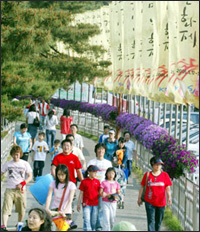Horse race parks become tourist attraction

Visitors walk toward the Seoul Race Park in Gwacheon, Gyeonggi Province, during a horse-themed cultural festival. / Courtesy of Korea Racing Authority
Horse racing tracks here have become a family-oriented leisure destination for both Koreans and foreign tourists as they offer not only races, but also a wide range of fun-packed events for people of any age.
The Korea Racing Authority (KRA), the sport’s local governing body, organizes flat races with thoroughbreds, which are composed of both imported and indigenous breeds, at three tracks in Seoul, Busan and on Jeju.
Seoul Race Park opened in Gwacheon, Gyeonggi Province in 1989 and sits on over 1 square kilometer of land in a location that people from Seoul can easily reach.
“At Seoul Race Park, the KRA has created an eco-friendly leisure park where people can interact with horses. There is an open-air botanical garden and other facilities for families,” a KRA spokesman said. “The park also organizes a number of seasonal festivals to entertain visitors.”
People can enjoy many features including rose gardens, pony riding for children and horse racing simulators. It sets up wading pools for children in summer and skating rinks in winter.
In a bid to expand its fan base across the country, the KRA built a new race park in the southeastern port city of Busan in August 2001.
Since opening, it has become a popular family-oriented leisure destination for those residing in the southeastern region.
It enables visitors to enjoy many horse-related exhibitions and experiences. There is pony riding, an entertainment area and a sled hill available year-round for children as well as horse racing simulators.
The Jeju Race Park, which opened in October 1990, was built to promote horse racing among visitors to the nation’s southern resort island, as well as to preserve the Korean native pony.
The Jeju track features a zoological garden where tourists can see various breeds of horses from one of the smallest, the Shetland pony, to one of the biggest, the Clydesdale that weighs about a ton. The park also operates children’s pony riding and a theme house where people can see symbols of fortune from all over the world.
The KRA’s three horse parks attract more than 20 million visitors every year. Races are weekly on Fridays, Saturdays and Sundays, with some exceptions for national holidays. On average, 12 to 16 races are conducted on a race day with an interval of 25 to 60 minutes between each one.
During mid-July to mid-August, when temperatures are very high, the races are at night to protect the horses and provide a more comfortable environment for spectators. <The Korea Times/Lee Hyo-sik>

























































